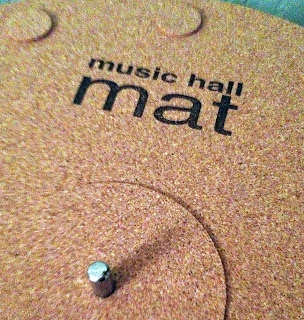For cartridge setup I use the Feickert Universal Protractor. In my opinion it's one of the best tools available for this purpose. I use it for alignment, and for getting a precise pivot to spindle measurement when mounting a tonearm.
 |
| An excellent alignment tool from Dr. Feickert Analogue |
Contact between the record and platter is also extremely important. Often an acrylic or properly finished MDF platter can be enough to ensure solid contact with little slip or static. If you happen to have one of the millions of metal platter turntables out there, you will most likely need a platter mat. It often becomes necessary to include a record clamp or weight as well just to ensure perfect contact and eliminate slip.
I have experimented with felt, rubber, cork, acrylic, and foam rubber mats. For my custom Thorens TD 316, I have found that the cork Music Hall Mat is the best fit. It has eliminated my need for a weight, which has the added benefit of relieving stress on the belt drive.
Another major factor in a pleasing analog experience is dust and static reduction. A properly grounded turntable and arm go a long way to eliminating static. If you're having excessive noise issues, it's a good idea to check this out thoroughly. Cleanliness is also key. I use the Spin Clean manual Record Washer II for vintage records before they ever get a spin, and then I use the Gruv Glide system to maintain cleanliness and discourage static. I also use Last Sylus Cleaner and brush to keep my stylus clean which can help reduce wear on the record and the stylus, and provide an improved audio signal.
 |
| This is an easy to use solution and makes a huge difference. |
Finally, picking a cartridge that is a good match for your tonearm is always paramount to quality playback. There are lots of low to mid level players that have tonearms that match a broad range of cartridges, but as you move up into audiophile-quality components, proper pairing becomes more and more important. I won't go into great detail here, but in general there is a range of effective mass in tonearms from light to heavy, and a range of compliance in cartridges from high to low. In theory a perfect match will be one of the following:
Cartridge Compliance Effective Mass
High Light
Medium Medium
Low Heavy
That's a bit oversimplified, and it suffices to say that most gear ranging from quality entry level (not the cheap department store gear) to low end audiophile-quality gear will be closer to medium compliance and mass, so your choice will depend largely on your taste, or what sounds best on your system. If you're buying really cheap gear, then there's not much you can do, and if you're a serious audiophile, then your purchase decisions warrant the effort to research and then audition each item to make sure you're getting it right.
My combination of choice is the Dynavector DV-20X high output moving coil cartridge, mounted on an Origin Live Onyx arm. These both fall in the lower end of what would be considered audiophile gear, and the combination is one I worked out over a year of research, including a few rounds of trial and error. Together they provide a lively, full range sound, without excessive coloration of the tone, and excellent tracking ability which means no skips, and minimal distortion.



